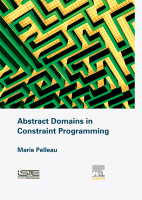Browse content
Table of contents
Actions for selected chapters
- Full text access
- Book chapterAbstract only
1 - State of the Art
Pages 1-51 - Book chapterAbstract only
2 - Abstract Interpretation for the Constraints
Pages 53-68 - Book chapterAbstract only
3 - Octagons
Pages 69-84 - Book chapterAbstract only
4 - Octagonal Solving
Pages 85-109 - Book chapterAbstract only
5 - An Abstract Solver: AbSolute
Pages 111-137 - Book chapterNo access
Conclusion and Perspectives
Pages 139-141 - Book chapterNo access
Bibliography
Pages 143-158 - Book chapterNo access
Index
Pages 159-160
About the book
Description
Constraint Programming aims at solving hard combinatorial problems, with a computation time increasing in practice exponentially. The methods are today efficient enough to solve large industrial problems, in a generic framework. However, solvers are dedicated to a single variable type: integer or real. Solving mixed problems relies on ad hoc transformations. In another field, Abstract Interpretation offers tools to prove program properties, by studying an abstraction of their concrete semantics, that is, the set of possible values of the variables during an execution. Various representations for these abstractions have been proposed. They are called abstract domains. Abstract domains can mix any type of variables, and even represent relations between the variables.
In this work, we define abstract domains for Constraint Programming, so as to build a generic solving method, dealing with both integer and real variables. We also study the octagons abstract domain, already defined in Abstract Interpretation. Guiding the search by the octagonal relations, we obtain good results on a continuous benchmark. We also define our solving method using Abstract Interpretation techniques, in order to include existing abstract domains. Our solver, AbSolute, is able to solve mixed problems and use relational domains.
Constraint Programming aims at solving hard combinatorial problems, with a computation time increasing in practice exponentially. The methods are today efficient enough to solve large industrial problems, in a generic framework. However, solvers are dedicated to a single variable type: integer or real. Solving mixed problems relies on ad hoc transformations. In another field, Abstract Interpretation offers tools to prove program properties, by studying an abstraction of their concrete semantics, that is, the set of possible values of the variables during an execution. Various representations for these abstractions have been proposed. They are called abstract domains. Abstract domains can mix any type of variables, and even represent relations between the variables.
In this work, we define abstract domains for Constraint Programming, so as to build a generic solving method, dealing with both integer and real variables. We also study the octagons abstract domain, already defined in Abstract Interpretation. Guiding the search by the octagonal relations, we obtain good results on a continuous benchmark. We also define our solving method using Abstract Interpretation techniques, in order to include existing abstract domains. Our solver, AbSolute, is able to solve mixed problems and use relational domains.
Key Features
- Exploits the over-approximation methods to integrate AI tools in the methods of CP
- Exploits the relationships captured to solve continuous problems more effectively
- Learn from the developers of a solver capable of handling practically all abstract domains
- Exploits the over-approximation methods to integrate AI tools in the methods of CP
- Exploits the relationships captured to solve continuous problems more effectively
- Learn from the developers of a solver capable of handling practically all abstract domains
Details
ISBN
978-1-78548-010-2
Language
English
Published
2015
Copyright
Copyright © 2015 ISTE Press Ltd. Published by Elsevier Ltd. All rights reserved.
Imprint
ISTE Press - Elsevier
